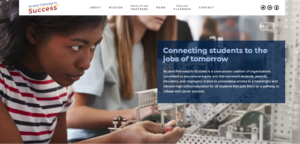July 19, 2010
Mitchell D. Chester Commissioner of Elementary and Secondary Education Massachusetts Department of Elementary and Secondary Education 75 Pleasant Street Malden, MA 02148
Dear Commissioner Chester:
As the former Director of the Office of Educational Technology at the United States Department of Education, and the President and CEO of the International Association for K‐12 Online Learning (iNACOL), I was alarmed and deeply concerned to see my name, and the name of the organization I represent, referenced in your memo to the Massachusetts Board of Elementary and Secondary Education (BESE) recommending some of the worst policies for student access to K‐12 online learning in the United States.
The memo gives the incorrect appearance that I provided counsel that helped to shape these proposed regulations. It is why I am compelled to write this letter and make clear my personal and professional beliefs, along with iNACOL’s position.
Let me be clear: iNACOL does not support your recommendations on virtual innovation schools and strongly urges BESE to reject these proposed regulations. iNACOL encourages BESE to adopt regulations that are within the intent of the law, and will support quality schools, encourage innovation, and enable all students access to public virtual schools without arbitrary barriers.
If these proposed regulations are enacted, I fear Massachusetts will take a significant step backward in virtual schooling and innovation, while other states surge ahead.
As you stated in your memo, you reached out to iNACOL as “a source for current research and best practices.” I was pleased to have the opportunity speak at length with you and the department of education staff (Beverley O’Riordan, Heidi Guarino, Jeffrey Nellhaus, Jeffrey Wulfson, Rhoda Schneider, and Connie Louie) on Thursday, July 1, 2010 to discuss best policies and quality standards to guide your recommendations to BESE.
Massachusetts’ new Innovation Schools law gave authority to the school districts, not the Department of Education or BESE, to oversee their own innovation schools and virtual schools. I commented that when states attempt to over‐regulate virtual schools, including student access to online learning, it leads to negative consequences. I stated that in Massachusetts, it would be a mistake for the department of education or BESE to drive external and overly‐prescriptive regulations on the districts, especially if that was outside the intent of the law.
I was asked about what other states were doing and the best practices. I shared that the best state policies allowed students to access both high‐quality online courses and full‐ time online programs without barriers or caps. I cited many specific examples of states that have adopted strong online learning policies that ensure accountability, quality, and the ability to scale to meet growing demand. I further highlighted reputable national studies, reports and experts that have validated these best policy practices. All of this information can be found at www.iNACOL.org.
I defined bad policy principally by two things: 1) restricting student access, including arbitrarily placing enrollment limits on the number of students and families who want to enroll in a virtual school course or program, and 2) placing artificial geographic barriers on these programs as a regulation (when virtual schools can reach students any time, any place), even in the most remote parts of the state where options are limited today.
Unfortunately, these are the exact policies that you recommended BESE adopt.
In your memo to BESE, you wrote that virtual schools are an “unproven pedagogy.” That is not true. In fact, the evidence suggests otherwise. For example, in 2009 the U.S. Department of Education released a meta‐analysis and review of online learning and found: “on average, students in online learning conditions performed better than those receiving facetoface instruction.”
There are more than 2,000,000 enrollments in K‐12 online learning in the U.S. today. Full‐time, multi‐district virtual schools are also rapidly growing and have operated in the U.S. for more than a decade. Virtual schools are the solution to expanding course options to students using web‐based technologies, highly qualified teachers delivering instruction using high‐quality, engaging, digital content and curriculum to personalize instruction for every student’s unique learning needs.
The proposed regulations mandating that 25% of enrollment in a virtual school must come from the sponsoring district, and only 2% of students can enroll in a virtual school from any single district, is horrible policy. The few states (e.g. Oregon) that have adopted such restrictive policies are mired in confusion and stagnancy. These policies are vigorously protested by parents, students, educators, and experts familiar with successful virtual school policy and practice. States with vibrant and innovative virtual schools have rejected these kinds of restrictions.
You described these regulations as “safeguards.” Enrollment caps and restrictions on students are not “safeguards,” they are arbitrary barriers. Such policies will force districts to conduct lotteries that create a system of winners and losers among kids. Students who want and need access to virtual schools will be locked out, not for any educational reason, but simply because they were unlucky. There is no research or evidence to suggest that virtual school enrollment restrictions lead to quality or academic success.
The suggestion I made during our call was that BESE not regulate school district virtual innovation schools beyond legislative intent, but instead provide them technical assistance by way of recommending quality standards. For example, BESE could encourage districts to adopt national quality standards for online courses, national quality standards for online teaching, and national quality standards for online programs, as many other states have done in helping their districts offer virtual schools.
As you can see, there is a vast incongruency between what I said in our conversation – and what the national studies and best practices support – and the recommendations you proposed to BESE.
With 1 in 4 college students taking an online course to graduate from college, iNACOL believes that the opportunities for K‐12 students should be increased to access new, 21st‐Century educational opportunities that work for millions of students around the country.
My final recommendation is to “walk the walk” in supporting innovation in K‐12 education in your state. Focus on enabling all school districts in Massachusetts to offer quality online programs based on established and strong national quality standards that can serve any student, anytime, anywhere in the state. Establishing this as your first principle will help Massachusetts become a national leader in innovation and online learning.
Sincerely,
Susan D. Patrick President and CEO International Association for K‐12 Online Learning







0 Comments
Leave a Comment
Your email address will not be published. All fields are required.